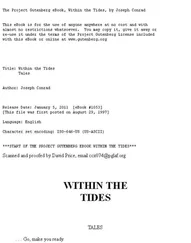1 ...8 9 10 12 13 14 ...23 “Even longer,” said Heyst, who had understood very well.
This seemed to imply that he had been wandering before he came under our observation. In what regions? And what early age? Mystery. Perhaps he was a bird that had never had a nest.
“I left school early,” he remarked once to Davidson, on the passage. “It was in England. A very good school. I was not a shining success there.”
The confessions of Heyst. Not one of us—with the probable exception of Morrison, who was dead—had ever heard so much of his history. It looks as if the experience of hermit life had the power to loosen one’s tongue, doesn’t it?
During that memorable passage, in the Sissie, which took about two days, he volunteered other hints—for you could not call it information—about his history. And Davidson was interested. He was interested not because the hints were exciting but because of that innate curiosity about our fellows which is a trait of human nature. Davidson’s existence, too, running the Sissie along the Java Sea and back again, was distinctly monotonous and, in a sense, lonely. He never had any sort of company on board. Native deck-passengers in plenty, of course, but never a white man, so the presence of Heyst for two days must have been a godsend. Davidson was telling us all about it afterwards. Heyst said that his father had written a lot of books. He was a philosopher.
“Seems to me he must have been something of a crank, too,” was Davidson’s comment. “Apparently he had quarrelled with his people in Sweden. Just the sort of father you would expect Heyst to have. Isn’t he a bit of a crank himself? He told me that directly his father died he lit out into the wide world on his own, and had been on the move till he fetched up against this famous coal business. Fits the son of the father somehow, don’t you think?”
For the rest, Heyst was as polite as ever. He offered to pay for his passage; but when Davidson refused to hear of it he seized him heartily by the hand, gave one of his courtly bows, and declared that he was touched by his friendly proceedings.
“I am not alluding to this trifling amount which you decline to take,” he went on, giving a shake to Davidson’s hand. “But I am touched by your humanity.” Another shake. “Believe me, I am profoundly aware of having been an object of it.” Final shake of the hand. All this meant that Heyst understood in a proper sense the little Sissie’s periodic appearance in sight of his hermitage.
“He’s a genuine gentleman,” Davidson said to us. “I was really sorry when he went ashore.”
We asked him where he had left Heyst.
“Why, in Sourabaya—where else?”
The Tesmans had their principal counting-house in Sourabaya. There had long existed a connection between Heyst and the Tesmans. The incongruity of a hermit having agents did not strike us, nor yet the absurdity of a forgotten cast-off, derelict manager of a wrecked, collapsed, vanished enterprise, having business to attend to. We said Sourabaya, of course, and took it for granted that he would stay with one of the Tesmans. One of us even wondered what sort of reception he would get; for it was known that Julius Tesman was unreasonably bitter about the Tropical Belt Coal fiasco. But Davidson set us right. It was nothing of the kind. Heyst went to stay in Schomberg’s hotel, going ashore in the hotel launch. Not that Schomberg would think of sending his launch alongside a mere trader like the Sissie. But she had been meeting a coasting mail-packet, and had been signalled to. Schomberg himself was steering her.
“You should have seen Schomberg’s eyes bulge out when Heyst jumped in with an ancient brown leather bag!” said Davidson. “He pretended not to know who it was—at first, anyway. I didn’t go ashore with them. We didn’t stay more than a couple of hours altogether. Landed two thousand coconuts and cleared out. I have agreed to pick him up again on my next trip in twenty days’ time.”
Davidson happened to be two days late on his return trip; no great matter, certainly, but he made a point of going ashore at once, during the hottest hour of the afternoon, to look for Heyst. Schomberg’s hotel stood back in an extensive enclosure containing a garden, some large trees, and, under their spreading boughs, a detached “hall available for concerts and other performances,” as Schomberg worded it in his advertisements. Torn, and fluttering bills, intimating in heavy red capitals CONCERTS EVERY NIGHT, were stuck on the brick pillars on each side of the gateway.
The walk had been long and confoundedly sunny. Davidson stood wiping his wet neck and face on what Schomberg called “the piazza.” Several doors opened on to it, but all the screens were down. Not a soul was in sight, not even a China boy—nothing but a lot of painted iron chairs and tables. Solitude, shade, and gloomy silence—and a faint, treacherous breeze which came from under the trees and quite unexpectedly caused the melting Davidson to shiver slightly—the little shiver of the tropics which in Sourabaya, especially, often means fever and the hospital to the incautious white man.
The prudent Davidson sought shelter in the nearest darkened room. In the artificial dusk, beyond the levels of shrouded billiard-tables, a white form heaved up from two chairs on which it had been extended. The middle of the day, table d’hote tiffin once over, was Schomberg’s easy time. He lounged out, portly, deliberate, on the defensive, the great fair beard like a cuirass over his manly chest. He did not like Davidson, never a very faithful client of his. He hit a bell on one of the tables as he went by, and asked in a distant, Officer-in-Reserve manner:
“You desire?”
The good Davidson, still sponging his wet neck, declared with simplicity that he had come to fetch away Heyst, as agreed.
“Not here!”
A Chinaman appeared in response to the bell. Schomberg turned to him very severely:
“Take the gentleman’s order.”
Davidson had to be going. Couldn’t wait—only begged that Heyst should be informed that the Sissie would leave at midnight.
“Not—here, I am telling you!”
Davidson slapped his thigh in concern.
“Dear me! Hospital, I suppose.” A natural enough surmise in a very feverish locality.
The Lieutenant of the Reserve only pursed up his mouth and raised his eyebrows without looking at him. It might have meant anything, but Davidson dismissed the hospital idea with confidence. However, he had to get hold of Heyst between this and midnight:
“He has been staying here?” he asked.
“Yes, he was staying here.”
“Can you tell me where he is now?” Davidson went on placidly. Within himself he was beginning to grow anxious, having developed the affection of a self-appointed protector towards Heyst. The answer he got was:
“Can’t tell. It’s none of my business,” accompanied by majestic oscillations of the hotel-keeper’s head, hinting at some awful mystery.
Davidson was placidity itself. It was his nature. He did not betray his sentiments, which were not favourable to Schomberg.
“I am sure to find out at the Tesmans’ office,” he thought. But it was a very hot hour, and if Heyst was down at the port he would have learned already that the Sissie was in. It was even possible that Heyst had already gone on board, where he could enjoy a coolness denied to the town. Davidson, being stout, was much preoccupied with coolness and inclined to immobility. He lingered awhile, as if irresolute. Schomberg, at the door, looking out, affected perfect indifference. He could not keep it up, though. Suddenly he turned inward and asked with brusque rage:
“You wanted to see him?”
“Why, yes,” said Davidson. “We agreed to meet—”
Читать дальше












